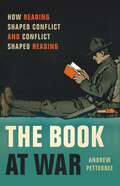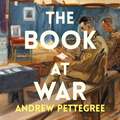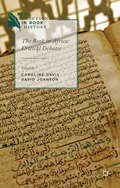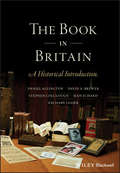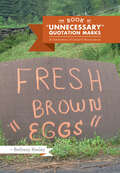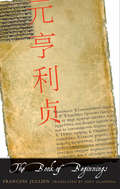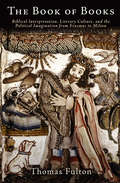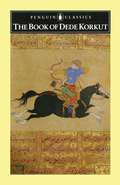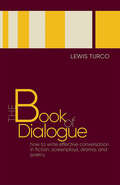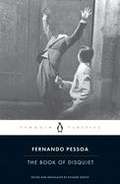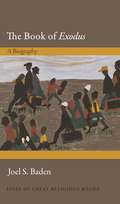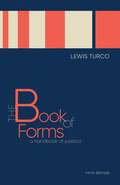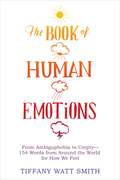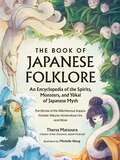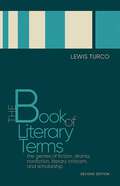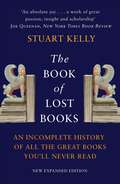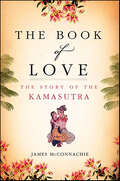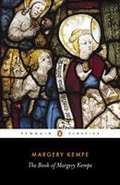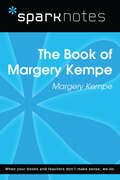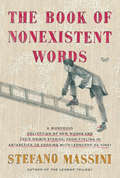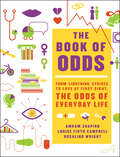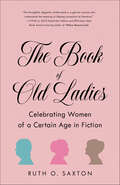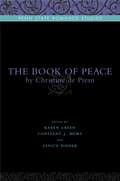- Table View
- List View
The Book at War: How Reading Shaped Conflict and Conflict Shaped Reading
by Andrew PettegreeA "magisterial" (Sunday Times) illumination of how books were used in war across the twentieth century—both as weapons and as agents for peace We tend not to talk about books and war in the same breath—one ranks among humanity&’s greatest inventions, the other among its most terrible. But as esteemed literary historian Andrew Pettegree demonstrates, the two are deeply intertwined. The Book at War explores the various roles that books have played in conflicts throughout the globe. Winston Churchill used a travel guide to plan the invasion of Norway, lonely families turned to libraries while their loved ones were fighting in the trenches, and during the Cold War both sides used books to spread their visions of how the world should be run. As solace or instruction manual, as critique or propaganda, books have shaped modern military history—for both good and ill. With precise historical analysis and sparkling prose, The Book at War accounts for the power—and the ambivalence—of words at war.
The Book at War: Libraries and Readers in an Age of Conflict
by Andrew PettegreeChairman Mao was a librarian. Stalin was a published poet. Evelyn Waugh served as a commando - before leaving to write Brideshead Revisited. Since the advent of modern warfare, books have all too often found themselves on the frontline.In The Book at War, acclaimed historian Andrew Pettegree traces the surprising ways in which written culture - from travel guides and scientific papers to Biggles and Anne Frank - has shaped, and been shaped, by the conflicts of the modern age. From the American Civil War to the invasion of Ukraine, books, authors and readershave gone to war - and in the process become both deadly weapons and our most persuasive arguments for peace
The Book in Africa
by David Johnson Caroline DavisThis volume presents new research and critical debates in African book history, and brings together a range of disciplinary perspectives by leading scholars in the subject. It includes case studies from across Africa, ranging from third-century manuscript traditions to twenty-first century internet communications.
The Book in Britain: A Historical Introduction
by Daniel Allington David A. Brewer Stephen Colclough Sian EchardIntroduces readers to the history of books in Britain—their significance, influence, and current and future status Presented as a comprehensive, up-to-date narrative, The Book in Britain: A Historical Introduction explores the impact of books, manuscripts, and other kinds of material texts on the cultures and societies of the British Isles. The text clearly explains the technicalities of printing and publishing and discusses the formal elements of books and manuscripts, which are necessary to facilitate an understanding of that impact. This collaboratively authored narrative history combines the knowledge and expertise of five scholars who seek to answer questions such as: How does the material form of a text affect its meaning? How do books shape political and religious movements? How have the economics of the book trade and copyright shaped the literary canon? Who has been included in and excluded from the world of books, and why? The Book in Britain: A Historical Introduction will appeal to all scholars, students, and historians interested in the written word and its continued production and presentation.
The Book of "Unnecessary" Quotation Marks: A Celebration of Creative Punctuation
by Bethany KeeleyFrom the popular blog, a hilarious and horrifying survey of quotation mark abuse in all its forms.From the sarcastic to the suggestive, here are quotation marks as we love them best, doing horrible damage to the English language. Who wouldn’t have second thoughts about ordering the “hamburger” on the diner’s menu? Would it be best to skip the “blowout” sale at the department store? What hidden price must be paid for something marked “free”? Assembled by the creator of the wildly popular “Blog” of “Unnecessary” Quotation Marks, this book surveys the havoc wreaked by quotation marks on signs, menus, placards, and posters that leave reality upended by supposed “facts.” This smarty-pants guide is “perfect” for desperate grammarians, habitual air quoters, and anyone who appreciates a good laugh.
The Book of Beginnings
by François Jullien Jody GladdingHow can a person from a Western culture enter into a way of thinking as different as that of the Chinese? Can a person truly escape from his or her own cultural perspectives and assumptions? French philosopher François Jullien has throughout his career explored the distances between European and Chinese thought. In this fascinating summation of his work, he takes an original approach to the conundrum of cross-cultural understanding. Jullien considers just three sentences in their original languages. Each is the first sentence of a seminal text: the Bible in Hebrew, Hesiod's Theogony in Greek, and the Yijing (I Ching) in Chinese. By dismantling these sentences, the author reveals the workings of each language and the ways of thought in which they are inscribed. He traces the hidden choices made by European reason and assumptions, discovering among other things what is not thought about. Through the lens of the Chinese language, Jullien offers, as always, a new and surprising view of our own Western culture.
The Book of Books: Biblical Interpretation, Literary Culture, and the Political Imagination from Erasmus to Milton
by Thomas FultonJust as the Reformation was a movement of intertwined theological and political aims, many individual authors of the time shifted back and forth between biblical interpretation and political writing. Two foundational figures in the history of the Renaissance Bible, Desiderius Erasmus and William Tyndale, are cases in point, one writing in Latin, the other in the vernacular. Erasmus undertook the project of retranslating and annotating the New Testament at the same time that he developed rhetorical approaches for addressing princes in his Education of a Christian Prince (1516); Tyndale was occupied with biblically inflected works such as his Obedience of a Christian Man (1528) while translating and annotating the first printed English Bibles.In The Book of Books, Thomas Fulton charts the process of recovery, interpretation, and reuse of scripture in early modern England, exploring the uses of the Bible as a supremely authoritative text that was continually transformed for political purposes. In a series of case studies linked to biblical translation, polemical tracts, and works of imaginative literature produced during the reigns of successive English rulers, he investigates the commerce between biblical interpretation, readership, and literary culture. Whereas scholars have often drawn exclusively on modern editions of the King James Version, Fulton turns our attention toward the specific Bibles that writers used and the specific manner in which they used them. In doing so, he argues that Spenser, Shakespeare, Milton, and others were in conversation not just with the biblical text itself, but with the rich interpretive and paratextual structures that accompanied it, revolving around sites of social controversy as well as the larger, often dynastically oriented conditions under which particular Bibles were created.
The Book of Dede Korkut
by Geoffrey LewisThe Book of Dede Korkut is a collection of twelve stories set in the heroic age of the Oghuz Turks, a nomadic tribe who had journeyed westwards through Central Asia from the ninth century onwards. The stories are peopled by characters as bizarre as they are unforgettable: Crazy Karchar, whose unpredictability requires an army of fleas to manage it; Kazan, who cheerfully pretends to necrophilia in order to escape from prison; the monster Goggle-eye; and the heroine Chichek, who shoots, races on horseback and wrestles her lover. Geoffrey Lewis's classic translation retains the odd and oddly appealing style of the stories, with their mixture of the colloquial, the poetic and the dignified, and magnificently conveys the way in which they bring to life a wild society and its inhabitants. This edition also includes an introduction, a map and explanatory notes.
The Book of Dialogue: How to Write Effective Conversation in Fiction, Screenplays, Drama, and Poetry
by Lewis TurcoThe Book of Dialogue is an invaluable resource for writers and students of narrative seeking to master the art of effective dialogue. The book will teach you how to use dialogue to lay the groundwork for events in a story, to balance dialogue with other story elements, to dramatize events through dialogue, and to strategically break up dialogue with other vital elements of your story in order to capture and hold a reader&’s or viewer&’s interest in the overall arc of the narrative.Writers will find Turco&’s classic an essential reference for crafting dialogue. Using dialogue to teach dialogue, Turco&’s chapters focus on narration, diction, speech, and genre dialogue. Through the Socratic dialogue method—invented by Plato in his dialogues outlining the teachings of Socrates—Turco provides an effective tool to teach effective discourse. He notes, &“Plato wrote lies in order to tell the truth. That&’s what a fiction writer does and has always done.&” Now it&’s your turn.
The Book of Disquiet
by Fernando PessoaFernando Pessoa was many writers in one. He attributed his prolific writings to a wide range of alternate selves, each of which had a distinct biography, ideology, and horoscope. When he died in 1935, Pessoa left behind a trunk filled with unfinished and unpublished writings, among which were the remarkable pages that make up his posthumous masterpiece, The Book of Disquiet, an astonishing work that, in George Steiner's words, "gives to Lisbon the haunting spell of Joyce's Dublin or Kafka's Prague." Published for the first time some fifty years after his death, this unique collection of short, aphoristic paragraphs comprises the "autobiography" of Bernardo Soares, one of Pessoa's alternate selves. Part intimate diary, part prose poetry, part descriptive narrative, captivatingly translated by Richard Zenith, The Book of Disquiet is one of the greatest works of the twentieth century.
The Book of Exodus: A Biography (Lives of Great Religious Books #48)
by Joel S. BadenAn essential biography of one of the Bible’s most powerful and inspiring booksExodus is the second book of the Hebrew Bible, but it may rank first in lasting cultural importance. It is here that the classic biblical themes of oppression and redemption, of human enslavement and divine salvation, are most dramatically expressed. Joel Baden tells the story of this influential and enduring book, tracing how its famous account of the Israelites’ journey to the promised land has been adopted and adapted for millennia, often in unexpected ways.Baden draws a distinction between the Exodus story and the book itself, which is one of the most multifaceted in the Bible, containing poems, law codes, rituals, and architectural plans. He shows how Exodus brings together an array of oral and written traditions from the ancient Middle East, and how it came to be ritualized in the Passover Seder and the Eucharist. Highlighting the remarkable resilience and flexibility of Exodus, Baden sheds light on how the bestowing of the Torah to Moses on Mount Sinai divided Jewish and Christian thinkers, on the importance of Exodus during the Reformation and the American Revolution, and on its uses in debates for and against slavery. He also traces how the defining narrative of ancient Israel helped to define Mormon social identity, the American civil rights movement, and liberation theology.Though three thousand years old, the Exodus—as history, as narrative, as metaphor, as model—continues to be vitally important for us today. Here is the essential biography of this incomparable spiritual masterpiece.
The Book of Forms: A Handbook of Poetics, Fifth Edition
by Lewis TurcoNow in its fifth edition, The Book of Forms: A Handbook of Poetics continues to be the go-to reference and guide for students, teachers, and critics. A companion for poets from novice to master, The Book of Forms has been called &“the poet&’s bible&” for more than fifty years. Filled with both common and rarely heard of forms and prosodies, Turco&’s engaging style and apt examples invite writers to try their hands at exploring forms in ways that challenge and enrich their work. Revised for today&’s poet, the fifth edition includes the classic rules of scansion and the useful Form-Finder Index alongside new examples of terms and prose that are essential to the study of all forms of poetry and verse. As Turco writes in the introduction, &“It should go without saying that the more one knows how to do, the more one can do.&”
The Book of Human Emotions: From Ambiguphobia to Umpty -- 154 Words from Around the World for How We Feel (Wellcome Ser.)
by Tiffany Watt SmithA thoughtful, gleeful encyclopedia of emotions, both broad and outrageously specific, from throughout history and around the world.How do you feel today? Is your heart fluttering in anticipation? Your stomach tight with nerves? Are you falling in love? Feeling a bit miffed? Do you have the heebie-jeebies? Are you antsy with iktsuarpok or filled with nakhes?Recent research suggests there are only six basic emotions. But if that makes you feel uneasy, suspicious, and maybe even a little bereft, THE BOOK OF HUMAN EMOTIONS is for you. In this unique book, you'll get to travel across the world and through time, learning how different cultures have articulated the human experience and picking up some fascinating new knowledge about yourself along the way.From the familiar (anger) to the foreign (zal), each entertaining and informative alphabetical entry reveals the surprising connections and fascinating facts behind our emotional lives. Whether you're in search of the perfect word to sum up that cozy feeling you get from being inside on a cold winter's night, surrounded by friends and good food (what the Dutch call gezelligheid), or wondering how nostalgia evolved from a fatal illness to enjoyable self-indulgence, Tiffany Watt Smith draws on history, anthropology, science, art, literature, music, and popular culture to find the answers.In reading THE BOOK OF HUMAN EMOTIONS, you'll discover feelings you never knew you had (like basorexia, the sudden urge to kiss someone) and gain unexpected insights into why you feel the way you do. Besides, aren't you curious what nginyiwarrarringu means?
The Book of Japanese Folklore: The Stories of the Mischievous Kappa, Trickster Kitsune, Horrendous Oni, and More (The Book of Japanese Folklore)
by Thersa MatsuuraDiscover everything you&’ve ever wondered about the legendary spirits, creatures, and figures of Japanese folklore including how they have found their way into every corner of our pop culture from the creator of the podcast Uncanny Japan.Welcome to The Book of Japanese Folklore: a fascinating journey through Japan&’s folklore through profiles of the legendary creatures and beings who continue to live on in pop culture today. From the sly kitsune to the orgrish oni and mischievous shape-shifting tanuki, learn all about the origins of these fantastical and mythical creatures. This gorgeous package is complete with stained edges and stunning four-color illustrations. With information on their cultural significance, a retelling of a popular tale tied to that particular yokai, and how it&’s been spun into today&’s popular culture, this handsome tome teaches you about the stories and histories of the beings that inspired characters in your favorite movies, animes, manga, and games. Adventure, mystery, and amazing tales await in The Book of Japanese Folklore.
The Book of Literary Terms: The Genres of Fiction, Drama, Nonfiction, Literary Criticism, and Scholarship, Second Edition
by Lewis TurcoThe much-anticipated second edition of The Book of Literary Terms features new examples and terms to enhance Turco&’s classic guide that students and scholars have relied on over the years as a definitive resource for the definitions of the major terms, forms, and styles of literature. Chapters covering fiction, drama, nonfiction, and literary criticism and scholarship offer readers a comprehensive guide to all forms of prose and their many sub-genres.From &“Utopian novel,&” &“videotape,&” and &“yellow journalism&” to &“kabuki play,&” &“Personalism,&” and &“Poststructuralism,&” this book is a valuable reference offering an extensive world of knowledge. Every teacher, student, critic, and general lover of literature should be sure to add The Book of Literary Terms to their library.
The Book of Lost Books: An Incomplete History of All the Great Books You'll Never Read
by Stuart KellyA &“clever and highly entertaining&” look at books through history that were stolen, went missing, or just never got written (The New York Times). In an age when deleted scenes from Adam Sandler movies are saved, it&’s sobering to realize that some of the world&’s great prose and poetry has gone missing. This witty and unique new book rectifies that wrong. Part detective story, part history, part exposé, The Book of Lost Books is the first guide to literature&’s what-ifs and never-weres. In compulsively readable fashion, this book reveals details about tantalizing vanished works by the famous, acclaimed, and influential, from the time of cave drawings to the late twentieth century. Here are true stories behind stories, poems, and plays that now exist only in imagination: ·Aristophanes&’ Heracles, the Stage Manager was one of the playwright&’s several spoofs that disappeared. ·Love&’s Labours Won may have been a sequel to Shakespeare&’s Love&’s Labours Lost—or was it just an alternative title for The Taming of the Shrew? ·Jane Austen&’s incomplete novel Sanditon was a critique of hypochondriacs and cures started when the author was fatally ill. ·Nikolai Gogol burned the second half of Dead Souls after a religious conversion convinced him that literature was paganism. ·Some of the thousand pages of William Burroughs&’s original Naked Lunch were stolen and sold on the street by Algerian street boys. ·Sylvia Plath&’s widower, Ted Hughes, claimed that the 130 pages of her second novel, perhaps based on their marriage, were lost after her death. Whether destroyed (Socrates&’ versions of Aesop&’s Fables), misplaced (Malcolm Lowry&’s Ultramarine, pinched from his publisher&’s car), interrupted by the author&’s death (Robert Louis Stevenson&’s Weir of Hermiston), or simply never begun (Vladimir Nabokov&’s Speak, America, a second volume of his memoirs), these missing links create a history of literature for a parallel world. Civilized, satirical, erudite yet accessible, The Book of Lost Books is a real find.
The Book of Love: The Story of the Kamasutra
by James McConnachieAn engaging, enlightening "biography" of the ancient Hindu manuscript that became the world's most famous sex manualThe Kamasutra is one of the world's best-known yet least-understood texts, its title instantly familiar but its actual contents widely misconstrued. In the popular imagination, it is a work of practical pornography, a how-to guide of absurdly acrobatic sexual techniques. Yet the book began its long life in third-century India as something quite different: a seven-volume vision of an ideal life of urbane sophistication, offering advice on matters from friendship to household decoration. Over the ensuing centuries, the Kamasutra was first celebrated, then neglected, and very nearly lost—until an outrageous adventurer introduced it to the West and earned literary immortality.In lively and lucid prose, James McConnachie provides a rare, intimate look at the exquisite civilization that produced this cultural cornerstone. He details the quest of famed explorer Richard F. Burton, who—along with his clandestine coterie of libertines and iconoclasts—unleashed the Kamasutra on English society as a deliberate slap at Victorian prudishness and paternalism. And he describes how the Kamasutra was driven underground into the hands of pirate pornographers, until the end of the Lady Chatterley obscenity ban thrust it once more into contentious daylight.The first work to tell the full story of the Kamasutra, The Book of Love explores how a remarkable way of looking at the world came to be cradled between book covers—and survived.
The Book of Margery Kempe
by B. A. WindeattHere Kemp recounts in vivid, unembarrassed detail the madness that followed the birth of the first of her fourteen children, the failure of her brewery business, her dramatic call to the spiritual life, her visions and uncontrollable tears, the struggle to convert her husband to a vow of chastity and her pilgrimages to Europe and the Holy Land.
The Book of Margery Kempe (SparkNotes Literature Guide Series)
by SparkNotesThe Book of Margery Kempe (SparkNotes Literature Guide) by Margery Kempe Making the reading experience fun!Created by Harvard students for students everywhere, SparkNotes is a new breed of study guide: smarter, better, faster.Geared to what today's students need to know, SparkNotes provides:chapter-by-chapter analysis explanations of key themes, motifs, and symbols a review quiz and essay topicsLively and accessible, these guides are perfect for late-night studying and writing papers.
The Book of Memory
by Mary CarruthersMary Carruthers's classic study of the training and uses of memory for a variety of purposes in European cultures during the Middle Ages has fundamentally changed the way scholars understand medieval culture. This fully revised and updated second edition considers afresh all the material and conclusions of the first. While responding to new directions in research inspired by the original, this new edition devotes much more attention to the role of trained memory in composition, whether of literature, music, architecture, or manuscript books. The new edition will reignite the debate on memory in medieval studies and, like the first, will be essential reading for scholars of history, music, the arts and literature, as well as those interested in issues of orality and literacy (anthropology), in the working and design of memory (both neuropsychology and artificial memory), and in the disciplines of meditation (religion).
The Book of Mothers: How Literature Can Help Us Reinvent Modern Motherhood
by Carrie Mullins"Timely and evergreen, engaging and infuriating, personal and universal—a necessary reintroduction to some of fiction's most familiar mothers." —Cecile Richards, bestselling author of Make Trouble and former president of Planned ParenthoodThis treasure trove for book lovers explores fifteen classic novels with memorable maternal figures, and examines how our cultural notions of motherhood have been shaped by literature.Sweet, supportive, dependable, selfless. Long before she had children of her own, journalist Carrie Mullins knew how mothers should behave. But how? Where did these expectations come from—and, more importantly, are they serving the mothers whose lives they shape? Carrie's suspicion, later crystallized while raising two small children, was that our culture’s idealization of motherhood was not only painfully limiting but harmful, leaving women to cope with impossible standards––standards rarely created by mothers themselves.To discover how we might talk about motherhood in a more realistic, nuanced, and inclusive way, Carrie turned to literature with memorable maternal figures for answers. Moving through the literary canon––from Pride and Prejudice and Little Women to The Great Gatsby, Beloved, Heartburn, and The Joy Luck Club—Carrie traces the origins of our modern mothering experience. By interrogating the influences of politics, economics, feminism, pop culture, and family life in each text, she identifies the factors that have shaped our prevailing views of motherhood, and puts these classics into conversation with the most urgent issues of the day. Who were these literary mothers, beyond their domestic responsibilities and familial demands? And what lessons do they have for us today—if we choose to listen?
The Book of Nonexistent Words
by Stefano MassiniThe internationally acclaimed author harnesses his brilliant imagination and masterful storytelling ability to create a catalog of new words inspired by stories of real people in this wondrous book reminiscent of Italo Calvino's mesmerizing Invisible Cities.How many times have words not been enough?How many complex feelings don’t have a corresponding noun that properly describes them?How many times has language left us like an archer without arrows in the labyrinth of our emotions?Award-winning author Stefano Massini, a master of expression,, made a discovery that shot new life into his writing practice. To his surprise he found that the ancient rules of language were not quite as restrictive as he had long envisioned them to be. With so many emotions and states of mind missing modern descriptors and definitions, Massini stumbled across a simple but artistry-altering idea. Instead of compromising honest expression through perfunctory verbiage, he decided language was, if anything, a flowing palette of colors he could use to paint all things. Words are meant to be invented. To reconfirm his belief in the magic of words, Massini returned to the wondrous mechanism that has fed dictionaries from time immemorial. If he could not find the precise word he wanted, he created one. In this delightful compendium, he introduces his personal vocabulary; every chapter mentions a new word that comes from a story about a real person, from Louis XIV to an American gangster.The Book of Nonexistent Words is a beautifully illustrated collection of linguistic origin stories wrought from the mind of an internationally renowned storytelling icon. Massini effectively liberates our human capacity for using language creatively and shows how we can embrace storytelling to fine tune our way of being in the world. Massini encourages us to be imaginative; if the language in the dictionary cannot adequately match the reality of the here and now, we must create new words that ring true.Translated from the Italian by Richard Dixon
The Book of Odds: From Lightning Strikes to Love at First Sight, the Odds of Everyday Life
by Amram Shapiro Louise Firth Campbell Rosalind WrightFrom the popular Book of Odds website, this stylish and accessible reference book offers a fascinating peek at the probabilities that govern every aspect of human lifeDid you know that your odds of dying from drowning are higher than the odds of meeting your mate on a blind date? That the odds a child has seen Internet porn are the same as the odds a person is right-handed? That nearly one in three adults believes in UFOs and nearly one in six has reported seeing one?Drawing from a rigorously researched trove of more than 400,000 statements of probability, based on the most accurate and current data available, The Book of Odds is a graphic reference source for stats on the everyday, the odd, and the outrageous—from sex and marriage, health and disease, beliefs and fears, to wealth, addiction, entertainment, and civic life. What emerges from this colorful and captivating volume is a rich portrait of who we are and how we live today.
The Book of Old Ladies: Celebrating Women of a Certain Age in Fiction
by Ruth O. SaxtonThis is a book that champions older women’s stories and challenges the limiting outcomes we seem to hold for them. The Book of Old Ladies introduces readers to thirty stories featuring fictional “women of a certain age” who increasingly become their truest selves. Their stories will entertain and provide insight into the stories we tell ourselves about the limits and opportunities of aging. A celebration of women who push back against the limiting stereotypes regarding older women’s possibility, The Book of Old Ladies is a book lover’s guide to approaching old age and dealing with its losses while still embracing beauty, creativity, connection, and wonder.
The Book of Peace: By Christine de Pizan (Penn State Romance Studies #5)
by Karen Green Constant J. Mews Janice PinderChristine de Pizan, one of the earliest known women authors, wrote the Livre de paix (Book of Peace) between 1412 and 1414, a period of severe corruption and civil unrest in her native France. The book offered Pizan a platform from which to expound her views on contemporary politics and to put forth a strict moral code to which she believed all governments should aspire. The text’s intended recipient was the dauphin, Louis of Guyenne; Christine felt that Louis had the political and social influence to fill a void left by years of incompetent leadership. Drawing in equal parts from the Bible and from classical ethical theory, the Livre de paix was revolutionary in its timing, viewpoint, and content. This volume, edited by Karen Green, Constant J. Mews, and Janice Pinder, boasts the first full English translation of Pizan’s work along with the original French text. The editors also place the Livre de paix in historical context, provide a brief biography of Pizan, and offer insight into the translation process.
